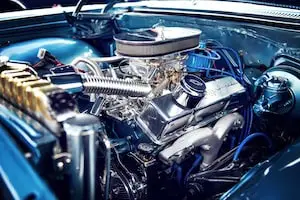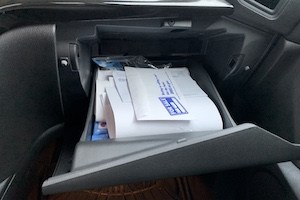New cars commonly have a 30,000 mile 2-year factory warranty. This is one of the greatest benefits of buying a new car and if the car is having issues soon after the purchase then it was a manufacturer error and should fall within their warranty. How do I check if my car is still under factory warranty or extended warranty?
The easiest way to check if your vehicle is still under warranty is to review the paperwork received when the car was purchased from the dealership. This paperwork is called the vehicle service contract (VSC). Without this paperwork, there are still these other ways to check on a vehicle warranty:
- Contact the dealership where the vehicle was purchased.
- Contact the financing company.
- Run a Carfax report.
- Contact the extended warranty provider.

When you purchased your car new, you most likely received a bumper-to-bumper factory warranty on your vehicle to cover any manufacturer defects. There are often great deals for the option of an extended warranty for not much money which adds time and or miles to the warranty.
Your vehicle is most likely under warranty if it is less than two years old, and may be under warranty later depending on if a factory warranty was purchased. Your contract informs you of the date of the start and expiration of the warranty. Many people do not realize that when things are done incorrectly, your warranty may be void. We will also go over those common areas of the vehicle contract.
Check the VSN for Factory Warranty Details
Find Your VIN Number
If you do not have or are unable to find your vehicle service contract (VSN), there are still several headache free ways to check on your vehicle’s warranty and they will all require knowing the vehicle identification number (VIN).
Search one of these areas to locate the VIN of your car:
The most common place to locate the vin is by looking on the outside of the windshield on the drivers’ side of the car just above the windshield wiper on the dash.
Look on the drivers’ side door. The VIN is almost always stamped or printed on a sticker here and is easily found inside the door jamb.
Check your car paperwork. The VIN is printed on your vehicle registration, and insurance card. Those are kept in your glove box along with these essential items.
Additional Ways to Check on Warranty
Contact the dealership where the vehicle was purchased
Make a quick phone call to the dealership where the vehicle was purchased. Provide them the VIN and request information regarding the warranty status on the vehicle.
This will only take a few minutes and is the next easiest method to determine if your car is still under warranty if you have not found the paperwork mentioned above.
If you do not remember where the car was purchased, it is possible to call a dealership of the same make as your vehicle and provide the VIN to them explaining your circumstance. They will be able to access the same information.
Contact the Financing Company
Most finance a car when they purchase a new car and dealerships often work with private financing corporations. If you are familiar with who you make your monthly car payment to, they can provide you with the same warranty information that you are looking for.
Call or even email the financing company for your vehicle and request the vehicle warranty information from them. They have the same information that you are provided with in the VSN.
Run a Carfax Report
Carfax is the benchmark provider for vehicle history. It will cost you money while these other options to look up your warranty are free, but is a good option if you are looking for more info than just the warranty.
A Carfax report will provide you with information such as:
- Previous sale dates of the vehicle
- Where the car was and when it was sold
- Where the car has been inspected and registered
- How many owners the car has had
- The mileage at each sale and maintenance period
- Service and maintenance done to the vehicle
- Recall information – if the vehicle should be taken in for a recall
- Title history – clean or salvage title
- Accident history – has the car been in any accidents and when
- Engine, transmission, paint and other specifications of the vehicle
Contact the Extended Warranty Provider
Many do not know that their extended warranty is provided through another business other than the dealership where the car was purchased. The car may be taken back to the dealership to be repaired and covered under the warranty but it is most often essentially insured by a private party extended warranty provider.
If you have purchased an extended warranty and know the name of the provider, call or email them providing your VIN and they will provide you with your extended warranty details.
Common Mistakes that May Void a Car Factory Warranty
The biggest most common mistake is to not follow the maintenance routine for oil changes etc. You must change your car oil before specified time intervals and
Other routine maintenance must be performed within certain time frames. Often you are required to take your vehicle in to the dealership to be inspected and perform regular maintenance such as filter changes.
Ask your dealership to provide you with information of what to do to avoid cancelling your warranty.
Bottom line is to take reasonable car of your car and read over the VSC to know what is required of you to maintain your vehicle warranty to save you heaps of money!
Compare your Warranty Information with the Vehicle
Now that you have the time and mileage for when your vehicle is under warranty, you can compare the date to the expiration date of the warranty as well as the reading on your odometer to that specified in the vehicle service contract.
If the car falls within the parameters and you have kept reasonably good care of your vehicle and followed the routine maintenance required for the warranty, then your car is still under warranty!
How to find out how long you have owned a vehicle
The vehicle service contract(VSC) will provide you with the date of sale of the vehicle from the dealership. If your was purchased used, the car title will indicate the date of sale. To view ownership of a vehicle in the past, Carfax provides a detailed history of the vehicle including dates when the vehicle was sold.


